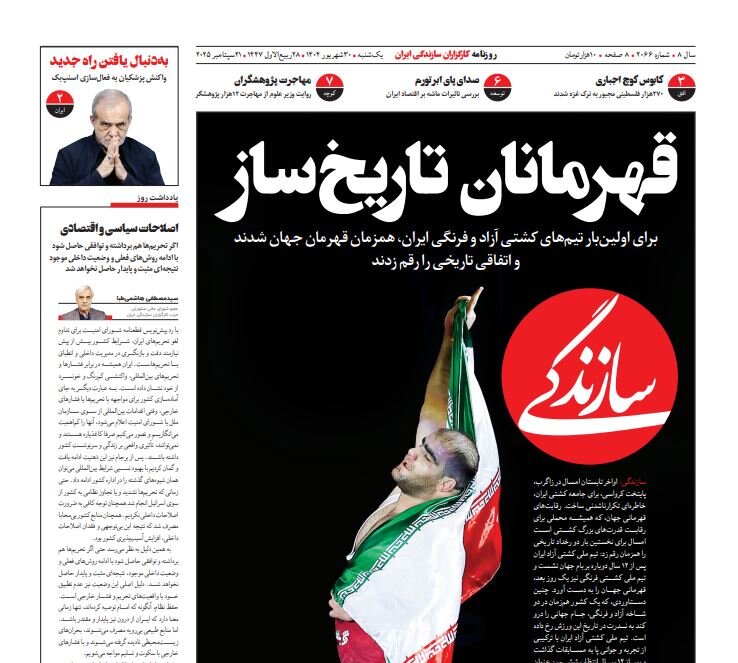Strategies needed to prevent snapback activation

TEHRAN - Sazandegi suggested the strategy that Iran should take to confront the activation of snapback sanctions and wrote: Iran needs to make decisions to ward off the risk of snapback activation and the return of sanctions in the short term within the next week to 10 days.
This moment is one of the most sensitive periods in the country's history, and any timely and bold decision can ward off the evil of snapback, reduce international pressure, and preserve Iran's national security and economic interests. The next point is extensive and active diplomatic movements. Today, Iran needs to strengthen its relations with influential countries at global and regional levels by using all its energies. The country's current situation requires a combination of active diplomacy, courageous decision-making, and internal cohesion in order to ward off the risk of snapback activation, sanctions, and international pressure with the least cost and the greatest effectiveness. Direct interaction with influential foreign officials is also a turning point in achieving these goals.
Ham Mihan: Improving Iran’s status by joining global campaign to recognize Palestinian State
Ham Mihan wrote about the global campaign to recognize the Palestinian State and the annual UN General Assembly conference is underway. It said, Undoubtedly, the formation of a Palestinian State, although in an unfair manner, will improve the living conditions of the people under occupation. A Palestinian State will grant the Palestinian people the right to membership in international organizations and the right to legitimate self-defense against the aggressor; and in the long run, it can help the Palestinian people gain more rights. By joining the global wave of support for the recognition of the Palestinian State, Iran will first improve its status within the framework of international mechanisms for resolving the Palestinian issue, and, as an active player, it can enter into the international talks and negotiations that are taking place in regard to the fate of the Palestinians. Today, Iran's seat in the negotiations for the future of the Palestinians is empty. While Iran insists on the rights of the Palestinian people, it does not participate in any diplomatic process to help them. It is a wrong impression that Iran’s presence in diplomatic processes that can help alleviate the suffering of the Palestinian people will cause dissatisfaction and disappoint the Palestinian people or resistance groups.
Vatan-e-Emrooz: Strategic autonomy and future prospects
Vatan-e-Emrooz wrote: A review of contemporary cases shows that many countries, though politically independent, lack true strategic autonomy. They may maneuver tactically, but at critical strategic moments they are compelled to compromise their national interests or align with the agendas of major powers. By contrast, Iran presents a different example, demonstrating that a degree of strategic autonomy can be attained—though it requires bearing certain costs. The world is transitioning from an era of unilateral American dominance to a multipolar order. In this new environment, only nations with genuine strategic autonomy will be able to shape the rules of the emerging system; the rest will be forced to operate on terms set by others, even when those terms run counter to their own national interests. We must therefore preserve our strategic autonomy by relying on domestic capabilities and national resolve. Otherwise, in the decades ahead, we risk becoming passive spectators, with Iran’s national interests and security sacrificed to the whims of regional and global powers.
Arman-e Melli: Quitting NPT or ceasing cooperation with IAEA will benefit Israel and US
Arman-e Melli has sought the views of Mohammad Hossein Beheshtipour, a senior international relations expert, as some inside Iran are proposing pulling out of the NPT or ceasing cooperation with the IAEA in response to the West’s activation of the snapback sanctions against Iran at the UN Security Council meeting on Friday. Beheshtipour said: At a time when U.S. and European pressure on Iran is increasing, withdrawing from the NPT is not only no solution, but a costly and dangerous path that would deprive Iran of its legitimate rights and create a new global consensus against the country. The best strategy for Iran is to remain within the framework of international law, make use of the IAEA’s mechanisms to prove the peaceful nature of its activities, and rely on domestic capabilities to withstand the pressure.
Wise policy lies not in emotional reactions, but in choosing a course that both preserves Iran’s rights and reduces threats, while paving the way for effective diplomacy. One of the chronic weaknesses in Iran’s foreign policy is becoming trapped in extremist viewpoints. Professional policy means accepting the positive actions of any country and openly criticizing its negative behavior, without being confined to partisan frameworks.
In the international arena, national interests must be the standard — not temporary alignments or ideological perspectives. The slogan of withdrawing from the NPT may appeal to some and convey a sense of power and independence, but foreign policy is not a stage for emotional displays. Another point is that criticizing certain actions of the IAEA — especially those that raise suspicions of politicization or espionage by some inspectors — is Iran’s undeniable right. However, the strategic mistake is to portray the Agency, rather than the United States and its maximum pressure policy, as the main culprit. The IAEA is, under international regulations, the sole authority for monitoring peaceful nuclear activities. If Iran’s cooperation with this body were to cease, it would bring about exactly what Washington and Tel Aviv have sought for years: the formation of a global consensus against Tehran.
Leave a Comment